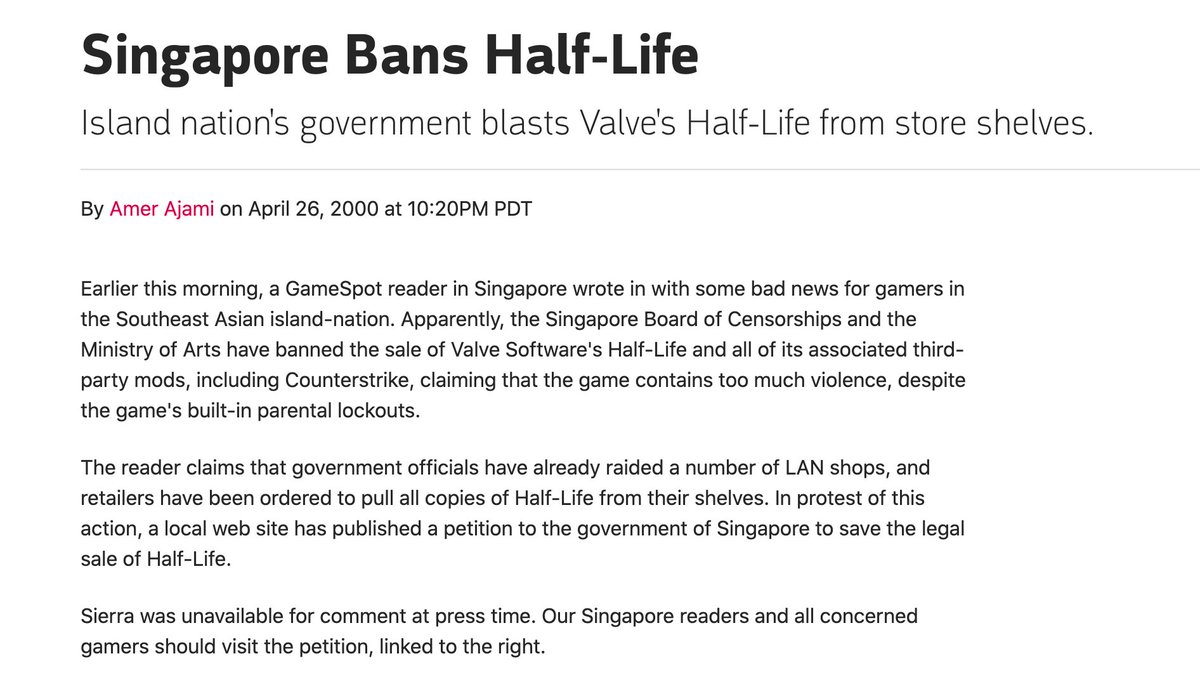🎮 What is the history of video game censorship in Singapore? And how was it shaped by public backlash, the video game industry, and international media?
A 🧵 of key points from my article: https://t.co/BTiM1epR4X
1/ Did you know the arcades were banned in Singapore during the 80s?
The moral panic over video game addiction caused a nationwide ban on arcades in 1983 — with arcades having to close up shop while game enthusiasts defended their hobby against parents in newspaper op-eds. https://t.co/XBBQp70jcg

2/ Video game enthusiasts were finding creative workarounds, however.
A year later, there were reports of people paying video game stores 2-4$ an hour to rent computers for games — an early precursor to our LAN shop / internet cafe culture! https://t.co/09rQlUIKZB

3/ In the 90s, attention turned towards halting the spread of violent video games.
One of the most well-known casualties of this new censorship regime was Mortal Kombat, with Singapore's Board of Film Censors raiding shops to seize copies of the game. https://t.co/EGfKhy7QV3

4/ These raids continued in the 2000s, with the high-profile (and very short-lived) ban of Half-Life.
Public backlash to this was strong, with one fan site organising a petition that gained thousands of signatures. https://t.co/SzCi06JL0u

5/ The most infamous video game ban came in 2007, when Singapore banned Mass Effect because it featured a scene with “lesbian intimacy”.
The ban provoked intense international media coverage and public backlash, and triggered an important reform to SG's censorship regime. https://t.co/IZbnGytBjF

6/ This was around the time when Singapore was busy courting video game giants to open up shop in SG, which was one of the Economic Development Board's key priorities in 2008
— and Ubisoft SG's opening was reportedly due to strong support from the gov: https://t.co/65YoRO4T40 https://t.co/YBV2RzNzGI

7/ Singapore's desire to become a capital of digital media development (https://t.co/gqs5LyqKkp) meant that a draconian video game censorship regime did not only make for bad press — it was also bad for business.
8/ So, Singapore introduced its own video game rating system (the first in Southeast Asia).
I genuinely do not envy the playtester going through video games to compile every potentially offensive point into IMDA's classification information. https://t.co/kPo6SGmNTu

9/ While the new system allowed for games which were previously banned to circulate in Singapore...
... it has also drawn criticism for how it restricts LGBT content and limits the ability of LGBT youth to see themselves in the games that they play: https://t.co/paiar4TpZ9 https://t.co/9dw82uB2wU

10/ Why is restricting LGBT content bad?
(Among other things,) there is research to show how positive media representations of LGBT people can be an important form of escapism, self-empowerment and community-building for LGBT youth: https://t.co/Wwk8Wk7BFl https://t.co/9JUM02CgrX

11/ SG's contradictory censorship regime:
Cyberpunk 2077, a game with customisable genitals and criticised for its transphobia, was given a M18 rating.
Meanwhile, we still don't know why Tell Me Why (the first major video game with a trans protagonist) is restricted in SG. https://t.co/Zs1rkTUXhj

12/ These days, censorship of video games is low-profile, and seems to barely attract local media reporting.
In 2015, Gamasutra broke the story of how civil servants asked a local studio to remove a gay character from their game: https://t.co/NAd9GXxkn6
Local media: 🦗🦗🦗
13/ Considering the important role of public backlash and outrage in shaping Singapore's regulation of video games, greater awareness about when and how the public was able to provoke change is needed.
At the very least, the state should explain its regulatory decisions.
14/ Overall, Singapore's video game bans were often ineffective and short-lived due to backlash + creative workarounds + the growing industry + sharp media coverage.
Don't like what you see? Demand answers.
If you found this insightful and want more long-form pieces on Singapore's media and politics, consider subscribing (at no cost) to my newsletter here: https://t.co/FOu01nOBFf
